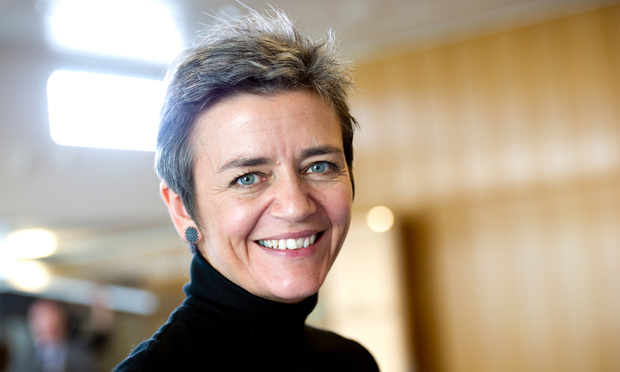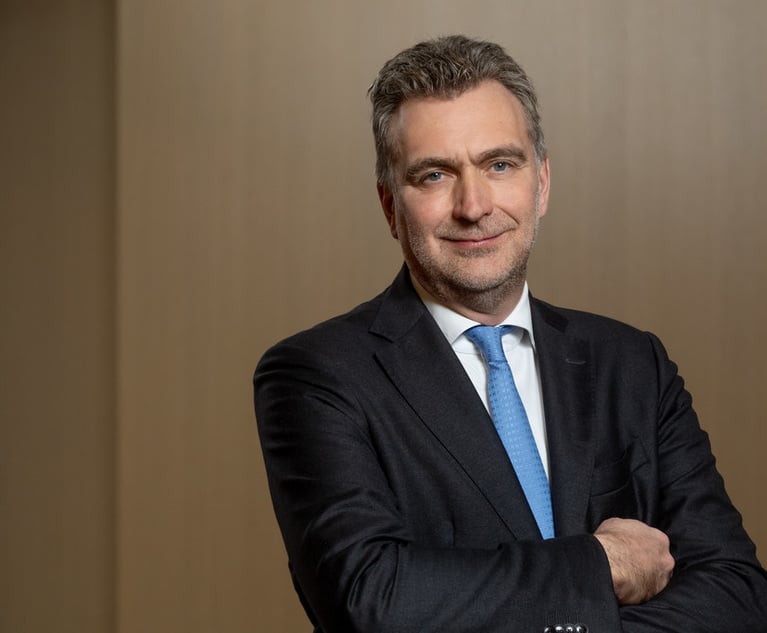EU Antitrust Enforcer Will Serve a Second Term and Take on Expanded Role
Margrethe Vestager, who as the enforcer of competition policy for the EU has taken on Big Tech, will remain in charge of EU competition policy for another five years and also become the EU's chief of digital policy.
September 10, 2019 at 01:47 PM
5 minute read
 Margrethe Vestager, the European Commissioner for Competition, has been nominated to a second five-year term and will also oversee the EU's digital policy. Photo: Johannes Jansson/norden.org
Margrethe Vestager, the European Commissioner for Competition, has been nominated to a second five-year term and will also oversee the EU's digital policy. Photo: Johannes Jansson/norden.org
Margrethe Vestager, who as the enforcer of competition policy for the EU has taken on such companies as Apple, Amazon, Facebook, Google and Qualcomm, will remain in charge of EU competition policy for another five years and assume the additional role of the EU's chief of digital policy, Ursula von der Leyen, the incoming president of the European Commission, announced on Tuesday.
In a surprise move, von der Leyen, a former defence minister of Germany, proposed giving Vestager the competition portfolio for a second term. In that role, she looks to end anti-competitive behaviour, vets mergers and breaks up cartels.
Normally, European commissioners only have the competition mandate for one five-year term. This is to avoid having the commissioner, who is usually a former politician, being unduly influenced by the staff of the competition department.
The move is likely to raise eyebrows in the U.S., where President Donald Trump has been critical of the actions she has taken against large tech companies. During her time as competition chief, Vestager has imposed record fines on Google and has demanded that the Irish government seize back-taxes of $15.4 billion from Apple.
Vestager, a former finance minister of Denmark for the liberal party, has held the competition position since 2014.
In addition to holding on to her position overseeing competition policy, Vestager will also lead the EU's digital policy.
Vestager's nomination, along with that of the other 26 members of the commission, still must be approved by members of the European Parliament. If she is approved, she will take office on November 1 along with the other nominees.
Asked why she had taken the unusual step of giving Vestager the competition portfolio for a second term, von der Leyen said: "The only aspect that matters in assigning [portfolios] is quality and excellence. Margrethe Vestager has done an outstanding job as competition commissioner."
Von der Leyen said that many competition issues were linked to the digital economy, so expanding Vestager's role to include the digital sector "is a perfect combination".
The decision to keep Vestager as the competition chief for a second term is also being seen as a sign that von der Leyen will resist attempts from France and Germany to exert increasing political influence over competition policy.
Last year, Germany's economy minister Peter Altmaier and France's finance minister Bruno Le Maire co-authored a paper calling for national capitals to have the final say over major merger decisions.
The plan met with strong opposition but France and Germany continue to argue that the economic threat from China means that EU competition policy should take into account the need to create European champions.
Resisting political interference in competition decisions has been one of Vestager's main achievements during the last five years.
Alec Burnside, a partner in Dechert's Brussels office, says Vestager faced a "veritable storm" from Paris and Berlin over her decision to block a merger between two train companies – Germany's Siemens and France's Alstom. The Commission blocked the merger in February of this year. "She's been remarkably resilient," Burnside says.
He added that Vestager has "strengthened" the Commission's reputation for competition enforcement and put the department "back on a straight course".
Vestager has also forced Google to change how it presents search results, so that it no longer discriminates against competitors.
The competition commissioner is in charge of a department of more than 500 officials, roughly half of whom work on antitrust and M&A cases.
In her position as executive vice-president for digital issues, Vestager will work closely with Mariya Gabriel, the commissioner from Bulgaria responsible for innovation and youth.
Von der Leyen also nominated Phil Hogan, the current commissioner for agriculture, to lead the EU's trade policy. Hogan, a former government minister from Ireland, will be in charge of dealing with the U.S. on trade disputes and will negotiate the U.K.'s post-Brexit trade deal with the EU.
Related Stories:
Qualcomm Slapped With $272M Antitrust Fine by European Commission
Amazon Faces EU Antitrust Investigation
EU Regulator Launches Probe Into Google Over Data Privacy
Dutch Antitrust Regulator Pursuing Investigation of Apple for Favouring Its Own Apps
EU Slaps Google With $1.7BN Antitrust Fine
Competition partners size up implications of Google's landmark European Commission fine
This content has been archived. It is available through our partners, LexisNexis® and Bloomberg Law.
To view this content, please continue to their sites.
Not a Lexis Subscriber?
Subscribe Now
Not a Bloomberg Law Subscriber?
Subscribe Now
NOT FOR REPRINT
© 2025 ALM Global, LLC, All Rights Reserved. Request academic re-use from www.copyright.com. All other uses, submit a request to [email protected]. For more information visit Asset & Logo Licensing.
You Might Like
View All

Jones Day, BCLP & Other Major Firms Boost European Teams with Key Partner Hires
4 minute read
$13.8 Billion Magomedov Claim Thrown Out by UK High Court
Trending Stories
- 1South Florida Attorney Charged With Aggravated Battery After Incident in Prime Rib Line
- 2'A Death Sentence for TikTok'?: Litigators and Experts Weigh Impact of Potential Ban on Creators and Data Privacy
- 3Bribery Case Against Former Lt. Gov. Brian Benjamin Is Dropped
- 4‘Extremely Disturbing’: AI Firms Face Class Action by ‘Taskers’ Exposed to Traumatic Content
- 5State Appeals Court Revives BraunHagey Lawsuit Alleging $4.2M Unlawful Wire to China
Who Got The Work
J. Brugh Lower of Gibbons has entered an appearance for industrial equipment supplier Devco Corporation in a pending trademark infringement lawsuit. The suit, accusing the defendant of selling knock-off Graco products, was filed Dec. 18 in New Jersey District Court by Rivkin Radler on behalf of Graco Inc. and Graco Minnesota. The case, assigned to U.S. District Judge Zahid N. Quraishi, is 3:24-cv-11294, Graco Inc. et al v. Devco Corporation.
Who Got The Work
Rebecca Maller-Stein and Kent A. Yalowitz of Arnold & Porter Kaye Scholer have entered their appearances for Hanaco Venture Capital and its executives, Lior Prosor and David Frankel, in a pending securities lawsuit. The action, filed on Dec. 24 in New York Southern District Court by Zell, Aron & Co. on behalf of Goldeneye Advisors, accuses the defendants of negligently and fraudulently managing the plaintiff's $1 million investment. The case, assigned to U.S. District Judge Vernon S. Broderick, is 1:24-cv-09918, Goldeneye Advisors, LLC v. Hanaco Venture Capital, Ltd. et al.
Who Got The Work
Attorneys from A&O Shearman has stepped in as defense counsel for Toronto-Dominion Bank and other defendants in a pending securities class action. The suit, filed Dec. 11 in New York Southern District Court by Bleichmar Fonti & Auld, accuses the defendants of concealing the bank's 'pervasive' deficiencies in regards to its compliance with the Bank Secrecy Act and the quality of its anti-money laundering controls. The case, assigned to U.S. District Judge Arun Subramanian, is 1:24-cv-09445, Gonzalez v. The Toronto-Dominion Bank et al.
Who Got The Work
Crown Castle International, a Pennsylvania company providing shared communications infrastructure, has turned to Luke D. Wolf of Gordon Rees Scully Mansukhani to fend off a pending breach-of-contract lawsuit. The court action, filed Nov. 25 in Michigan Eastern District Court by Hooper Hathaway PC on behalf of The Town Residences LLC, accuses Crown Castle of failing to transfer approximately $30,000 in utility payments from T-Mobile in breach of a roof-top lease and assignment agreement. The case, assigned to U.S. District Judge Susan K. Declercq, is 2:24-cv-13131, The Town Residences LLC v. T-Mobile US, Inc. et al.
Who Got The Work
Wilfred P. Coronato and Daniel M. Schwartz of McCarter & English have stepped in as defense counsel to Electrolux Home Products Inc. in a pending product liability lawsuit. The court action, filed Nov. 26 in New York Eastern District Court by Poulos Lopiccolo PC and Nagel Rice LLP on behalf of David Stern, alleges that the defendant's refrigerators’ drawers and shelving repeatedly break and fall apart within months after purchase. The case, assigned to U.S. District Judge Joan M. Azrack, is 2:24-cv-08204, Stern v. Electrolux Home Products, Inc.
Featured Firms
Law Offices of Gary Martin Hays & Associates, P.C.
(470) 294-1674
Law Offices of Mark E. Salomone
(857) 444-6468
Smith & Hassler
(713) 739-1250









